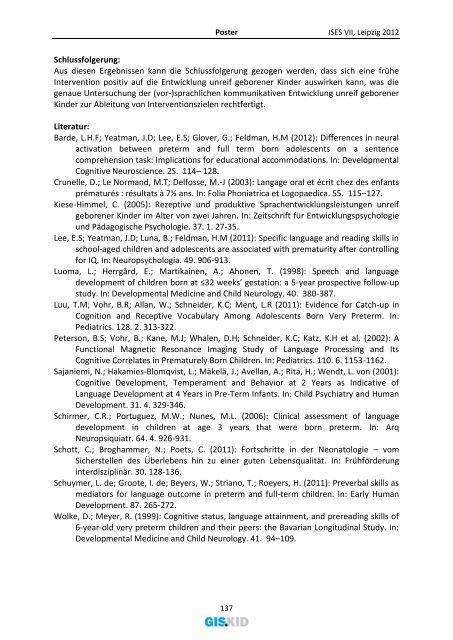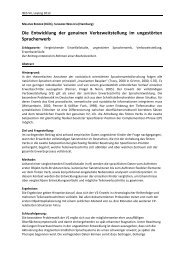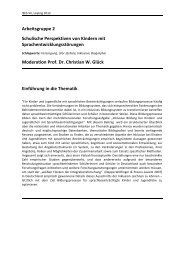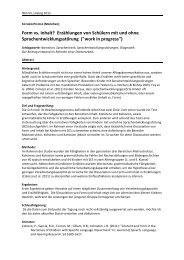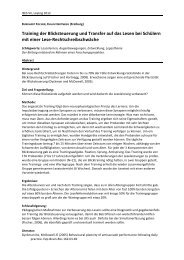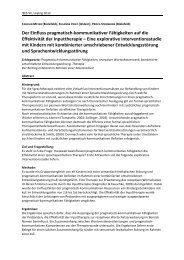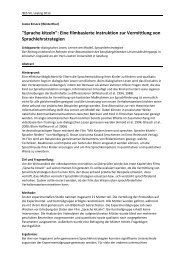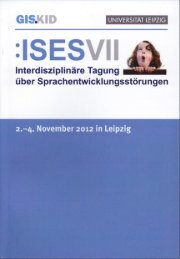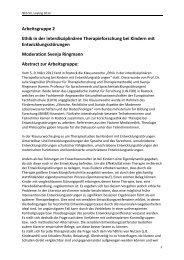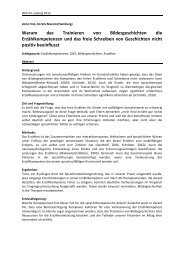Abstractband - giskid
Abstractband - giskid
Abstractband - giskid
Sie wollen auch ein ePaper? Erhöhen Sie die Reichweite Ihrer Titel.
YUMPU macht aus Druck-PDFs automatisch weboptimierte ePaper, die Google liebt.
Poster ISES VII, Leipzig 2012<br />
Schlussfolgerung:<br />
Aus diesen Ergebnissen kann die Schlussfolgerung gezogen werden, dass sich eine frühe<br />
Intervention positiv auf die Entwicklung unreif geborener Kinder auswirken kann, was die<br />
genaue Untersuchung der (vor-)sprachlichen kommunikativen Entwicklung unreif geborener<br />
Kinder zur Ableitung von Interventionszielen rechtfertigt.<br />
Literatur:<br />
Barde, L.H.F; Yeatman, J.D; Lee, E.S; Glover, G.; Feldman, H.M (2012): Differences in neural<br />
activation between preterm and full term born adolescents on a sentence<br />
comprehension task: Implications for educational accommodations. In: Developmental<br />
Cognitive Neuroscience. 2S. 114– 128.<br />
Crunelle, D.; Le Normand, M.T; Delfosse, M.-J (2003): Langage oral et écrit chez des enfants<br />
prématurés : résultats à 7½ ans. In: Folia Phoniatrica et Logopaedica. 55. 115–127.<br />
Kiese-Himmel, C. (2005): Rezeptive und produktive Sprachentwicklungsleistungen unreif<br />
geborener Kinder im Alter von zwei Jahren. In: Zeitschrift für Entwicklungspsychologie<br />
und Pädagogische Psychologie. 37. 1. 27-35.<br />
Lee, E.S; Yeatman, J.D; Luna, B.; Feldman, H.M (2011): Specific language and reading skills in<br />
school-aged children and adolescents are associated with prematurity after controlling<br />
for IQ. In: Neuropsychologia. 49. 906-913.<br />
Luoma, L.; Herrgård, E.; Martikainen, A.; Ahonen, T. (1998): Speech and language<br />
development of children born at ≤32 weeks’ gestation: a 5-year prospective follow-up<br />
study. In: Developmental Medicine and Child Neurology. 40. 380-387.<br />
Luu, T.M; Vohr, B.R; Allan, W.; Schneider, K.C; Ment, L.R (2011): Evidence for Catch-up in<br />
Cognition and Receptive Vocabulary Among Adolescents Born Very Preterm. In:<br />
Pediatrics. 128. 2. 313-322.<br />
Peterson, B.S; Vohr, B.; Kane, M.J; Whalen, D.H; Schneider, K.C; Katz, K.H et al. (2002): A<br />
Functional Magnetic Resonance Imaging Study of Language Processing and Its<br />
Cognitive Correlates in Prematurely Born Children. In: Pediatrics. 110. 6. 1153-1162.<br />
Sajaniemi, N.; Hakamies-Blomqvist, L.; Mäkelä, J.; Avellan, A.; Rita, H.; Wendt, L. von (2001):<br />
Cognitive Development, Temperament and Behavior at 2 Years as Indicative of<br />
Language Development at 4 Years in Pre-Term Infants. In: Child Psychiatry and Human<br />
Development. 31. 4. 329-346.<br />
Schirmer, C.R.; Portuguez, M.W.; Nunes, M.L. (2006): Clinical assessment of language<br />
development in children at age 3 years that were born preterm. In: Arq<br />
Neuropsiquiatr. 64. 4. 926-931.<br />
Schott, C.; Broghammer, N.; Poets, C. (2011): Fortschritte in der Neonatologie – vom<br />
Sicherstellen des Überlebens hin zu einer guten Lebensqualität. In: Frühförderung<br />
interdisziplinär. 30. 128-136.<br />
Schuymer, L. de; Groote, I. de; Beyers, W.; Striano, T.; Roeyers, H. (2011): Preverbal skills as<br />
mediators for language outcome in preterm and full-term children. In: Early Human<br />
Development. 87. 265-272.<br />
Wolke, D.; Meyer, R. (1999): Cognitive status, language attainment, and prereading skills of<br />
6-year-old very preterm children and their peers: the Bavarian Longitudinal Study. In:<br />
Developmental Medicine and Child Neurology. 41. 94–109.<br />
137


